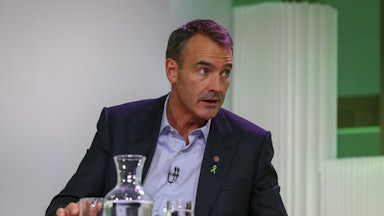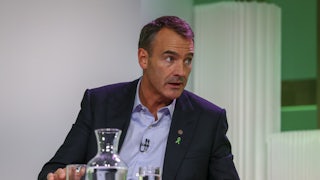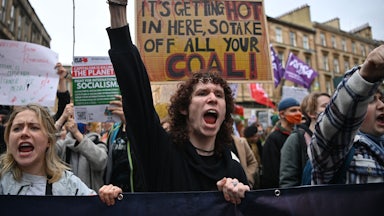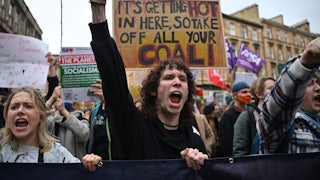The release of a new report from the Intergovernmental Panel on Climate Change this week has provoked a new round of discussion about how best to talk about the dire crisis it describes. Climate scientist Katharine Hayhoe says it’s important to project hope and emphasize solutions. Fear, she told CBC Radio, “causes us to freeze rather than take action.” The outlet opted for a perhaps overzealous headline: “Climate change fear can be paralyzing. But you can spur action through hope, says scientist.”
Along similar lines, Hannah Ritchie—lead researcher for the think tank Our World in Data—argued at Vox this week that doomerism is counterproductive. “I don’t want to talk about whether pessimism is accurate. I want to focus on whether it’s useful,” she wrote. “We need optimism to make progress—yet that alone isn’t enough. To contend with environmental crises and make life better for everyone, we need the right kind of optimists: those who recognize that the world will only improve if we fight for it.”
Ritchie isn’t the first to question whether shouting apocalypse is either a good strategy for fueling action to reduce emissions or the right way to understand the problem. But the terms of the climate communications debate have always been fuzzy. What action is being spurred? What is being fought for? And who is guilty of all this bad messaging?
On one hand, it’s understandable that climate advocates would think about the best way to communicate about climate change. On the other, fixating on finding the perfect tone for climate communication mistakes messaging and mindset for a theory of change. Getting off fossil fuels requires replacing the lifeblood of capitalism on a stunningly quick timeline, and replacing it with alternatives just now coming into their own. Doing that isn’t so much an issue of pessimism or optimism but of political economy. To wrap your head around this gargantuan challenge—let alone start to do something about it—the socialist lens, which focuses on the material conditions of a problem, offers some useful insights. The reason there is now a “rapidly closing window of opportunity to secure a liveable and sustainable future for all,” per the latest IPCC report, isn’t because some ill-defined mass of climate-concerned people has been insufficiently hopeful in public. It’s because the people who want to pass adequate climate policies have significantly less power and money than the people who want to obstruct such policies.
The right has long called climate change a leftist Trojan horse to overthrow capitalism. The anti-capitalist left, though, has been a relatively marginal force in the fight against climate change as long as there’s been one. Global warming emerged as a headline-grabbing issue in the 1990s at the zenith of neoliberalism, amid the collapse of the USSR and what many saw as the triumph of capitalism. Market forces were thought to be the cure for whatever might ail people and the planet. Leading environmental nongovernmental organizations accordingly pushed for market-based solutions like emissions trading as the primary fix for global warming, believing that governments and corporations could align around sufficiently business-friendly solutions. The world was thought to look something like economic models whose basic units were perfectly rational individuals searching to optimize for their best interest: If the individuals who happened to run countries or fossil fuel companies could be persuaded that climate policy was in their best interest, then they would support it. Environmentalists, therefore, sought to enlighten world leaders and corporate executives about supposedly win-win climate measures behind closed doors and through awareness-raising campaigns. Marxist concepts like class conflict and historical materialism were comparatively unfashionable, even (many thought) dangerous. History, after all, had ended.
Yet the fossil fuel companies working to sabotage early climate talks in the ’90s saw things in starkly material terms. Policies to reduce greenhouse gases threatened their business model. Naturally, they sought to protect that business model. They did so by spreading disinformation about climate change and lobbying to stop governments from doing anything meaningful about it.
As the industry’s own scientists compiled internal reports about the reality of rising temperatures—and their companies’ contributions to it—they funded advertising and advocacy pushes designed to stop national and global emissions-reduction efforts in their tracks. “An estimated rise in water level, due to global warming, of 0.5 meters may be assumed,” Mobil Oil engineers wrote in 1996 about their Sable field gas project, jointly owned with Shell and the Canadian Exxon subsidiary Imperial Oil. A year later, a joint investigation by the Los Angeles Times and Columbia University Graduate School of Journalism’s Energy and Environmental Reporting Project subsequently found, Mobil Oil placed ads in The Washington Post and The New York Times fearmongering about the Kyoto Protocol, a precursor to the Paris Agreement: “Let’s face it: The science of climate change is too uncertain to mandate a plan of action that could plunge economies into turmoil,” the ad stated. “Scientists cannot predict with certainty if temperatures will increase, by how much and where changes will occur.”
Ritchie’s basic premises seem right. There’s no case to be made for resigning ourselves to the climate crisis; every tenth of a degree of warming prevented saves tens of millions of lives. People paralyzed by anxiety about climate change aren’t well suited to fight it. But it’s not clear who or what is supposed to make some critical mass of people more optimistic, or what they are supposed to do when they become that way.
Ritchie notes in her Vox piece that she has adapted her “framework for bringing about societal change” from right-wing billionaire Peter Thiel’s entrepreneurial bible, Zero to One. As Thiel does, she taxonomizes people along axes of changeability (“changeable” or “not changeable”) and optimism (“optimistic” or “pessimistic”). The ideal people, according to this framework, are optimists who see the future as changeable but who aren’t complacent that it will happen on its own. Among these “people who move the world forward” are those developing various low-carbon and environmentally minded technologies.
There’s a problem, though, with interpreting this people-evaluating matrix as an empirically grounded roadmap to societal change. Innovations she cites, like cultivated meat and new kinds of solar panels, may well be important. But the positive outlook credited with inspiring them probably won’t convince either fossil fuel executives or governments whose public budgets and development paths still depend on fossil fuels to phase out oil and gas.
Consider last week’s debate over the Summary for Policymakers of the new IPCC report, a shortened version subject to line-by-line edits from governments; this one is a hotly contested 22 pages. Those talks stretched two days beyond what was initially scheduled. Per the International Institute for Sustainable Development’s Earth Negotiations Bulletin—the sole media outlet allowed in the room—poorer country delegates who could not change their flights left before the proceedings ended. Meanwhile, richer countries, whose delegates could change their flights and who have the most to lose from a rapid transition away from fossil fuels, argued for more cautious language about phasing them out. Per the IISD report, delegates from Saudi Arabia—where roughly half of gross domestic product flows from hydrocarbon revenues—consistently pushed for language that would give oil and gas a longer timeline.
According to the Thiel quadrant system, the Saudi Arabian delegates—like their counterparts in privately run fossil fuel companies like Exxon—might be changeable pessimists, looking out for their own as they fight to extract the last barrel of oil. Would adopting a more positive outlook change their stance on climate policies that would render the core of their economy irrelevant?
No. Life doesn’t play out exactly along the lines of vulgar Marxism. But a Marxist, materialist lens isn’t a bad tool to have in the box—and likely a good deal more helpful than trying to manage people’s feelings so they can become cleantech entrepreneurs.










